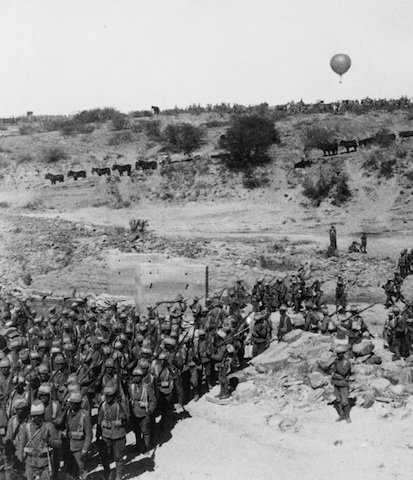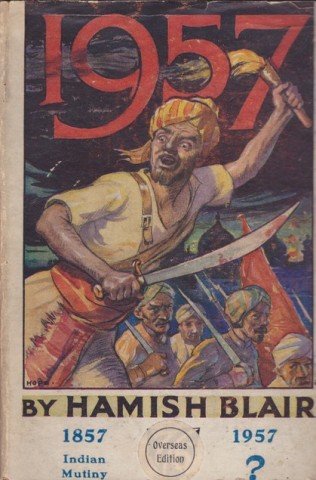In 1923, the Salisbury Committee enquired into the proper relationship between the RAF, on the one hand, and the Army and Navy, on the other. According to Andrew Boyle's biography of Hugh Trenchard, the then Chief of the Air Staff quoted a recent statement by Sir Ian Hamilton (the commander at Gallipoli) at some point during this inquiry:
Surely we who have witnessed the Germans doing star turns over London and the second exodus of the Jews, surely we will be worse than Thomas Didymus if we do not put the conquest of the air above the conquest of the sea?1
This needs a little explaining. The bit about the Germans must be a reference to the Gotha raids on London in 1917-8, when the German bombers seemed to come and go with impunity. Thomas Didymus, Google informs me, was the apostle Thomas, so I suppose this is a reference to doubting Thomas, meaning that with all this evidence, there's no longer any reason to doubt that the air is more important than the sea. And the second exodus of the Jews? Admittedly, I haven't read all of Hamilton's article (or whatever it was), but still, I'm pretty sure that this is an anti-Semitic libel.
Anti-Semitism was not uncommon in interwar Britain. This is well-known, but it's sometimes represented as merely unpleasant and relatively benign -- which it certainly was when compared with some other countries. However, it could go beyond mere unpleasantness into real ugliness. One idea which was floating around in airpower writing in the early 1920s is that Jews were especially likely to crack under the pressure of bombing. And that supposedly, during the Gotha and other air raids on London, rich Jews had fled the city for the safety of the seaside resorts -- Hamilton's 'second exodus' -- while poor ones stayed in the East End but ran around in a blind panic.
Sometimes Jews were referred to in code. For example, the authors of Air Raid Damage in London (1923), published by the British Fire Prevention Committee, referred to 'aliens', which I think would have been commonly understood to mean, primarily, Jews (the Aliens Act of 1905 was largely aimed against Jewish immigration). They asserted that during air raids, 'the average Londoner, both male and female, showed his usual equanimity and sang-froid, often under most trying circumstances', but then added that:
Any individual who was panic-stricken or lost his morale was the exception, but where he did, it was largely due to the bad influence of the alien or semi-alien population, who, with but few exceptions, behaved in a manner that was both despicable and dangerous.2
So their implication is that while the British behaved splendidly, the aliens did not -- but then, they're not really British anyway, are they? The trashier more popular end of the spectrum of knock-out blow novels was more blatantly anti-Semitic, and often owed as much to fears of 'the enemy in our midst' as to the fear of the bomber. William le Queux, the grand master of really, really bad invasion and spy novels, tried his hand at an air-scare story in 1920, The Terror of the Air. In le Queux's world, even being bombarded with pamphlets is enough to send Jews over the edge:
The atmosphere before was electrical; the fall of the leaflets let loose the storm. Babel broke forth. Miles away people heard the noise of the shouting and screaming. The scene was bad enough in the purely English districts, but in the East End, in Soho, and similar quarters where Jews and foreigners of all types were still herded together, swamping the native population, the panic was indescribable.3
Even the Earl of Halsbury's relatively classy 1944 features a pretty clear, negative Jewish stereotype: a 'more than usually fat and prosperous-looking diner' named Griesheim, 'with large pudgy hands and an oleaginous smile' and worth over £2 million. When the air raid begins he tramples over the woman in front of him in his rush to get out of the restaurant, and a young Englishman is forced to punch his 'bloated jaw' to show him that this sort of thing just isn't done.4
By the 1930s, this sort of thing was becoming rarer -- possibly because events in Germany were making expressions of anti-Semitism less acceptable.5 One writer who did repeat it was the retired RAF officer L. E. O. Charlton. In War over England (1936), in a section on the First World War air raids, he wrote that
The foreign folk in the crowded East End district were singularly liable to an unreasoning panic, particularly the preponderating Jewish element [...] it is an undoubted fact that in the air-raid periods they were far more subject to alarm than the body of the people with whom they dwelt [...] the distress of Jewish mothers and children was very difficult to soothe. They would scream loudly, tearing their clothes and beating their breasts [...] bands of young aliens belonging to neutral or allied countries, shedding every vestige of manhood, would behave like animals of the wild, sometimes brutally trampling people to death in a mad, insensate rush for safety.
Charlton at least suggested that this behaviour was 'probably the result of harsh treatment and persecution through the ages from every nation under the sun'.6 But unsurprisingly, the fascist J. F. C. Fuller left out that part when quoting the socialist Charlton's book the following year.7 Again, the message is that the 'real' British are made of sterner stuff than the inferior foreign types living among them, who will be a liability in wartime.
To be sure, this repellent anti-Semitic streak was only present in a fairly small fraction of books about the next war from the air in the 1920s and 1930s. (Perhaps because it wouldn't help their arguments to suggest that only a minority of a city's inhabitants would break under the pressure of bombing.) But then again, neither did many writers take trouble to refute this libel. The only one I've come across is J. M. Spaight, in Air Power and War Rights (1924):
No doubt, on the whole, London took the air raids with dignity and composure, but no one who is acquainted with the facts can admit that the people who left London to crowd into Maidenhead, Manchester, Brighton and other safer towns, were exclusively "Jews and aliens."8
So, thank you, Spaight, for not being an anti-Semite!
![]() This work is licensed under a Creative Commons Attribution-NonCommercial-NoDerivatives 4.0 International License.
Permissions beyond the scope of this license may be available at http://airminded.org/copyright/.
This work is licensed under a Creative Commons Attribution-NonCommercial-NoDerivatives 4.0 International License.
Permissions beyond the scope of this license may be available at http://airminded.org/copyright/.
- Andrew Boyle, Trenchard (London: Collins, 1962), 469. [↩]
- E. C. P. Monson and Ellis Marsland, Air Raid Damage in London (London: British Fire Prevention Committee, 1923), 8. [↩]
- William le Queux, The Terror of the Air (London: Herbert Jenkins, n.d [1920]), 71. [↩]
- Earl of Halsbury, 1944 (London: Thornton Butterworth, 1926), 89, 97. [↩]
- Not for Hamilton though: by this time he was a Nazi sympathiser, possessed of an anti-Semitism which 'had a distinct racial edge to it, beyond the conventional anti-Jewish sentiment which was commonplace at the time in much of the British upper class, in that he was prepared to stipulate negative physical features and behavioural characteristics of Jews'. Ian Kershaw, Making Friends with Hitler: Lord Londonderry and Britain's Road to War (London: Allen Lane, 2004), 55. [↩]
- L. E. O. Charlton, War over England (London, New York and Toronto: Longmans, Green and Co., 1936), 13. [↩]
- J. F. C. Fuller, Towards Armageddon: The Defence Problem and its Solution (London: Lovat Dickson, 1937), 168. [↩]
- J. M. Spaight, Air Power and War Rights (London: Longmans, Green and Co., 1924), 9. Spaight also quoted a historian of the war to the same effect, A. F. Pollard's Short History of the Great War, 308, which I haven't seen. [↩]




Alan Allport
Orwell, Antisemitism in Britain, 1945:
Brett Holman
Post authorSee, Orwell knows what I'm talking about! (One day I have got to read everything he ever wrote ...)
Jonathan Dresner
Fascinating stuff. I spend more time with the Imperial side of British history, and tend to forget the extent to which they shared the French view of Jews....
Brett Holman
Post authorIt's one of those things that just pulls you up short, when a dose of anti-Semitism pops up in an otherwise fairly sensible piece. I think it's because it was so widespread and normal, it would have been unremarkable at the time. And I suppose that's why so few airpower writers tried to refute the 'second exodus' -- it was just so normal. France gets a bad rap because of the Dreyfus affair, and so it should, but at least it forced the French to take sides on the issue, to bring it out into the open and debate it. That never happened in Britain. (Still, credit where credit's due: the first exposure of the Protocols of the Elders of Zion hoax did take place in the Times in 1921. That's not nothing.)
Ian Evans
I don't think you can credit the Dreyfus affair with "bringing things out into the open". Don't forget that France had openly antisemitic political parties already, plus the ultramontanes who wanted to move society back at least to prerevolutionary times, if not further - and it was the revolution that gave Jews full citizenship.
I'm glad you like Orwell (doesn't quite atone for sending us Murdoch though!). There was a fairly complete set (novels excepted) of his writing published in the Seventies, later brought out in paperback, four volumes, by Penguin.
If you are digging into antisemitism and aeronautica, try finding some of C.G.Grey's bletherings.
Bit short on time at the moment, but I'll link you quickly to York again. Go back to Clifford's Tower, the history plate at the bottom of the mound has been reworded since I was a lad. Certainly until the mid-60's it referred to the burning of the Jews in the Tower as the "Jewish Riots"
Jakob
Everyman's library have a rather nice edition of Orwell's collected essays that I dip into from time to time.
I don't think Edgerton looks at anti-semitism specifically in England and the Aeroplane, but I'm fairly sure it's mentioned in passing. Personally whenever I see Grey's name mentioned I mentally preface it with "raving nutcase"...
Brett Holman
Post authorGrey was a class act, no doubt about it. Edgerton does specifically mention Grey's anti-Semitism, and quotes (p. 57) an editorial of his raving about the need for a strong air force for fighting the enemies of the 'White Race'. Sadly the Aeroplane isn't available here, or I could immerse myself in more of Grey's rantings ...
Ian:
Hey, we may have sent you Rupert, but that doesn't mean you had to let him in! Fair point about the Dreyfus affair, but still ... the trial and the controversy over it weren't just symptomatic of French anti-Semitism, were they, but events which nudged French society onto a slightly different path? Maybe not into the open but certainly onto centre-stage. (Britain has also had moments where anti-Semitism was more visible, of course, such as the BUF's activities in the East End, or some of the 'Hidden Hand' stuff in WWI. But nothing like Dreyfus.)
Pingback:
Airminded · Monday, 9 September 1940
Pingback:
On Googling British terror bombing